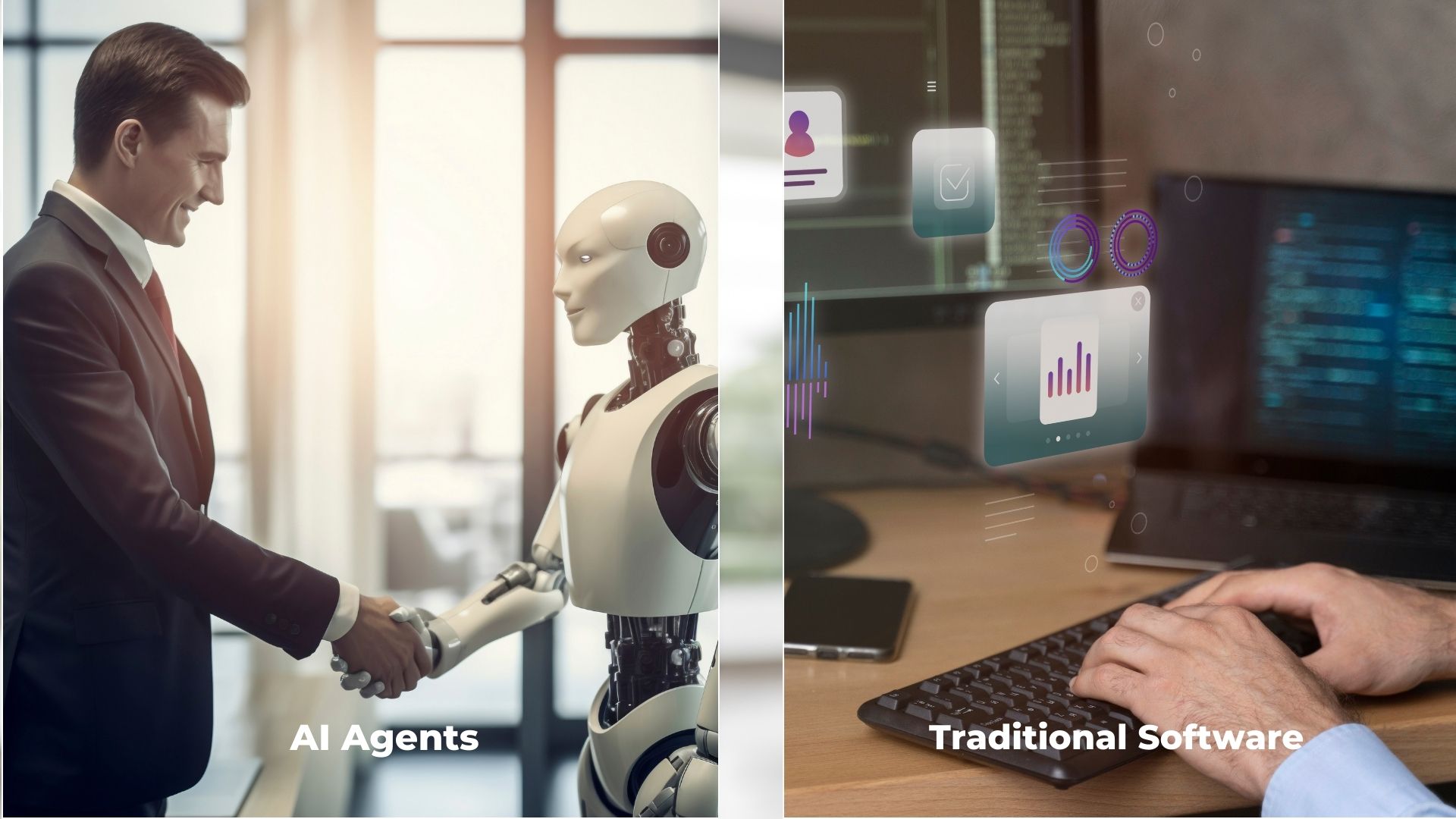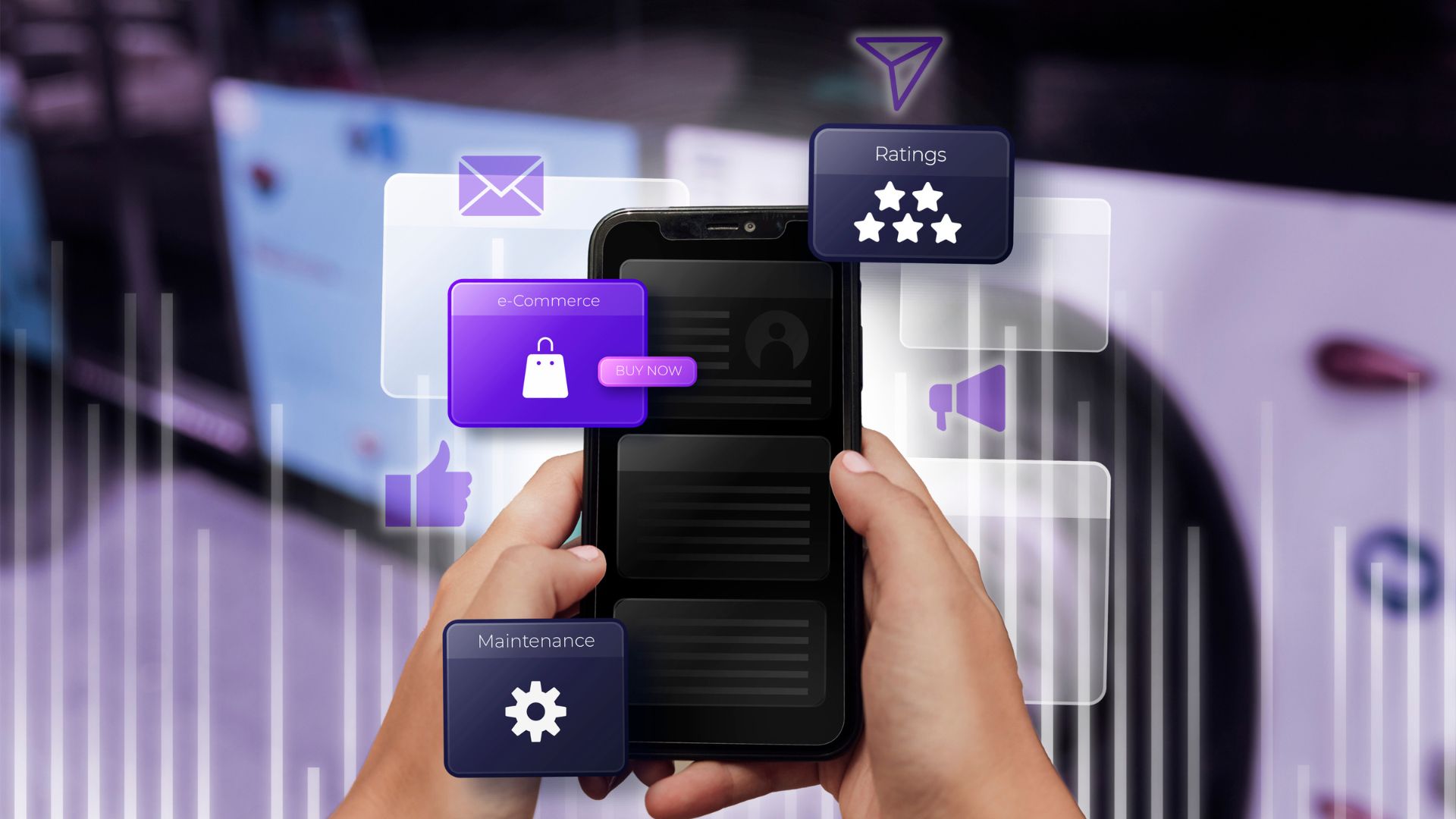AI Agents vs. Traditional Software: A Comparative Analysis for Business Leaders
29 Aug 2024 | Action Agents
Related Posts
Oct 2024
Top Benefits of Automating Business Tasks with AI
Efficiency is the word in today's fast-paced business arena, and it can be achieved through optimal efficiency by automating tasks. This has been made possible by AI business tools, and many companies now keep their operations streamlined and highly productive with the ability to avoid costs in important ways to achieve organisational performance excellence. In this blog, we shall discuss the best things you can do when you automate business tasks using AI and how that can revolutionize all your operations. Why Do Business Automate Tasks Using AI? Running a business is a rather tedious affair requiring many tasks that tend to be vulnerable to human errors. From answering consumer inquiries to processing data, several tasks, though very much necessary, may consume so much time from the labour force. Companies can look at adopting AI productivity solutions that will enable them to automate most repetitive processes in many areas to allow teams to concentrate on strategic growth initiations. Whether it be automated replies via email, scheduling, or setting of data sets, AI is no longer something that only cutting-edge businesses must stay on top of; it is about staying on top of the competition in today's business world.Let's now dive into the benefits AI task automation offers to a business: 1. Increased efficiency and productivity The most significant benefit of using AI business tools is that it makes things more efficient and productive. AI can avoid doing repetitive tasks and lengthy tasks that would take human a long time to do.For example, instead of manually typing answers to customer inquiries, an AI-powered chatbot takes care of FAQs 24/7 for an instant response so human beings can then devote themselves to important tasks like strategy and customer engagement. Companies should establish the competency and methods for automation procedures, allowing processes, such as data entry, customer support, and inventory control, to be done without delays in operations. 2. Cost Reduction AI automation leads to massive cost savings as firms do not need to maintain big teams that may perform several mundane jobs. However, that is not the elimination of jobs but rather the realignment of human resources towards more complex and strategic work that incorporates creativity and critical thinking skills. Automation also helps avoid costly mistakes made due to human errors. AI eliminates unnecessary financial loss due to errors and speeds up workflow processes for long-term cost savings. 3. Reduced Error and More Accuracy Human beings tend to make errors, especially when performing repetitive and mundane tasks. On the other hand, AI perfects tasks by being remarkably accurate. Automated systems can process a high volume of data, transactions, or even customer orders without causing an error. Such accuracy is particularly crucial for businesses involved in finance, healthcare, and logistics, where a mistake is significantly very expensive. Business entities can ensure that the right task gets completed with minimal risk of error and at the right time through proper usage of AI productivity solutions. 4. Better Data Management and Analytics Data is the blood of today's business, and proper management of the same is considered crucial to success. AI-driven tools can analyze large data sets rapidly and offer actionable information that other humans may miss. For example, businesses can use AI to monitor customer behaviour, analyze purchasing patterns, or monitor supply chain performance. Such automation of the collection and analysis of data assures that businesses become informed sooner rather than later. Data management is eased with AI business tools, paving the way to better decision-making and increased reaction to market trends. 5. Improved Customer Experience There is huge potential in chatbots, virtual assistants, and recommendation engines to improve the customer experience. They can provide instant response to the customer and can assist customers at each step while being distinctly more personalized. Customers expect quick responses with AI that delivers personalized recommendations or ideas. A chatbot will reach out to answer customer inquiries or guide a customer in making a buying decision at any time of the day while attending to the problems of the customer. Consistency in interaction with customers boosts satisfaction and helps gain the trust of your audience. 6. Scalability As the business grows, so does the number of tasks to be managed. Scaling manually is not an easy task to do and is also very costly. AI-based automation cannot be matched by the manual process. Whether your company requires handling extra numbers of customer queries, ramping up production, or supplementing data analysis, AI can handle the increased load without increasing the headcount. Automating tasks enables business houses to expand quickly and organically. Increasing online business activities are ready to take up the newer demands that are bound to arrive. 7. Availability AI technologies run 24/7, round the clock. This is very useful to businesses operating in various time zones or across countries. AI can be used in the direction of automation of tasks to make customer service, data processing, and other such activities possible even after working hours. This means that the business is running all the time, and its service level improves and critical tasks get done on time. 8. Better Resource Usage AI automation provides the ability to use resources better. Traditionally, people waste precious time and energy in doing things that can be repetitive or mundane. Then they can spend more quality time doing something meaningful as far as contributing to the long-term goals of the company through innovation or strategy development and even through major relationships with clients. This should improve employee engagement. By using AI productivity solutions, one can use more resources of humans in the areas that add more value. 9. Faster decision-making AI tools now arrive to process and analyze data in real-time. With such accurate insights coming through much faster than ever, a business can take on-the-go decisions. Whether it is to analyze sales trends, customer feedback, or market conditions, AI business tools present valuable data that greatly speeds up decision-making. Quick decision-making often means the difference between competitive markets of businesses, allowing for better opportunities and mitigating certain risks. 10. Compliance and Risk Management Most industries are highly regulated, and with that comes the need to ensure that compliance with laws and industry standards is achieved. AI can help automate compliance checks and significantly lower the risk of non-compliance to ensure that your business stays legal at all times. Some of the important implications for companies are that AI tools can flag potential risks ahead of time before they occur. It can check financial transactions, analyze security vulnerabilities, and ultimately ensure that your business stays protected from risks and liabilities. How to Implement AI Task Automation in Your Business? Identify Repetitive Tasks Begin by recognizing which tasks are a waste of time for your business operations. These are usually routine processes in which there is little human creativity involved, such as data entry, customer support, or scheduling. Choose the Right AI Tools There are more than enough AI business tools, each designed to meet specific needs. If you need help with customer support, marketing automation, or data analysis, research and choose the right tool, that fits your unique business requirements. Train Your Team As much as you can automate with AI, it is still important that you get your team familiar with the tools you are implementing. Provide training and support that will help your employees use AI at its full potential. Monitor and Optimize Once the AI tools are deployed, you need to monitor their performance and constantly collect feedback from employees and customers to perfect the automation process. This will enable them to be updated to fit your changing business needs. Conclusion This is not a choice between being ahead of your competition but also getting the maximum efficiency, lowered costs, and improved quality in customer experience through it. There are always repetitive tasks that can be automated by AI, decisions based on data, and the ability to scale with reduced overhead. Whether a small business wants to grow or a large enterprise wants to streamline, business AI tools are the perfect answer to cope up with the challenges in today's world.Consider adopting AI productivity solutions today to get your business on a trajectory towards sustained success.
Oct 2024
5 Best AI Agents to Streamline Business Operations
Today's business environment demands automation ahead of the competition. Companies constantly try to optimize processes and achieve further efficiency, and they tend to identify AI agents as one of the most effective channels for this. We are hiring AI agents that can allow businesses to automate tasks with greater efficiency and precision. With so many different functions carried out by AI agents, operations can be scaled, prices dropped, and productivity increased.This blog will cover the five top AI agents to help make your business processes and explain how they can reform them. We'll see AI agents for data processing, customer support, marketing automation, sales assistance, and custom AI solutions. Let's start with how to take your business to the next level. 1. Data Processing AI Agent Data processing constitutes one of the greatest necessities of any business. However, sorting and analyzing data manually takes much time and at times can be very human-error-prone. AI agent data processing reduces this entire process by automatically collecting, extracting, and analyzing data. These AI agents can process high volumes of data at incredibly high speeds, recognize patterns, and produce actionable insights that form viable business decisions.Key Benefits:Improved Accuracy: Since reduction in human error ensures precise data analytics and insights.Time Efficiency: Processes that would take hours or days now complete in minutes.Data-Driven Decisions: Such systems provide real-time analytics, and because of this, businesses are actually able to make strategic decisions in a prompt as well as efficient manner.There are different AI agents that have been designed to specifically target certain requirements, such as financial reporting automation, analysis of customer data, or large-scale data processing for research. 2. Customer Support AI Agent Excellent customer support goes a long way to maintain strong loyalty to your customers. It can be tough, however, especially for smaller to medium-sized businesses, to manage different customer inquiries. A Customer Support AI Agent helps automate such routine tasking, such as answering FAQs, doing basic troubleshooting, and giving product information. This frees the support team to focus more on the difficult issues.Key Benefits:24/7 Availability: AI agents can give customer support at any time of the day, ensuring that customers are also catered for at all times, 24/7.Zero Wait Time: Instant replies to frequently asked questions increases satisfaction ratesCost-Effective Solution: Save money from hiring a large customer support team. 3. Marketing Automation AI Agent Tasks involved with marketing, such as generating leads, sending out emails and managing social media campaigns, consume time and other resources in significant proportions. In that regard, the Marketing Automation AI Agent automates a number of those tasks so that marketing teams can efficiently work with campaigns, activate customers, and generate leads for the company. These agents will make sure they schedule social media posts, personalize email content based on the behaviour of users, and optimize ad campaigns to maximize returns on investment.Key Benefits:Better lead generation: This captures and nurtures leads automatically with the help of sending personalized content based on user interactions.Better campaign management: It schedules and manages marketing campaigns without much manual input because it ensures consistency across channels.Data-driven marketing: This is through analyzing campaign performance and attuning strategies with the help of AI algorithms to encourage better results.Our Marketing Automation AI Agents will connect third-party applications like Mailchimp, Salesforce, and Facebook Ads so businesses will not be bothered going through different tools. 4. Sales Assistant AI Agent There is so much routine that sales teams are bogged down in, like checking up on leads, scheduling appointments, and updating information on customers in the CRM. A Sales Assistance AI Agent will help automate such tasks to enable the sales representatives to actually close deals and form relationships. An effective sales team can work much more efficiently and close deals faster through automating routine tasks.Key Benefits:Automate Follow-Ups: Follow up with potential leads through emails at the right time, by AI agents.Lead Score: The probability of conversion of leads will be prioritized. Thus, sales can focus on higher-value prospects.CRM Updates: Customer information gets updated into the CRM system from time to time, saving data entry time.We offer sales assistance AI agents which can configure to engage with any tool like Salesforce, Zoho CRM, or Pipedrive, making AI easier to integrate into streamlining your sales process. 5. Custom AI Solutions While pre-built AI agents work well for all standard tasks, in some businesses, needs are unique, and a custom solution is the only option. Custom AI Solutions by us enable businesses to develop AI agents that precisely fulfil specific needs. From managing complex supply chains to automating financial risk assessments or niche industry-specific activities, custom AI solutions can be delivered as needed. Main Advantages: Tailor-made Functionality: The AI capability might be customized to the specific workflows and needs of your business.Scalability: Customized AI agents may extend your business, scaling up with its needs.Competitive Advantage: Developing a custom AI solution keeps you ahead of the competition since you're using technology pertinent to your business model.We are creating a custom AI solution that entails the development of an understanding of your business needs. From there, it would be designed as an AI workflow, then developed and integrated as an agent into existing systems to ensure easy transitioning. The Power of AI Integration for Business Automation Integration of AI agents into business operations is more than the mere automation of some process, but rather a strategic approach to business automation to improve efficiencies, reduce human error, and allow employees to do high-value activities. The benefits of using AI agents for business include:Cost Savings: Automation saves on the cost of human labor - which translates into saving on employment, training, and salaries. Productivity Enhancement: Employees are free to concentrate on high-value strategic tasks that leverage human judgment, creativity, and problem-solving abilities while daily mundane and repetitive tasks are left for automation by AI agents. Scalability: AI can easily scale with the business, thus allowing the entity to scale without necessarily having to invest in increased employees.Data-Driven Decision-Making: Real-time analysis of big data by AI agents leads to the provision of insights that enable businesses to make quick and accurate decisions. Why choose us? We are an AI agent hiring platform, covering a wide range of services and easy integration with AI. With thousands of businesses worldwide trusting the platform to automate business processes, we offer:High Number of Available AI Agents: From pre-built AI agents for most frequent business tasks to custom AI solutions, there is an option for every business need. Easy Integration: The system makes the integration process of AI agents into your workflow as smooth as possible with no disruptions.Expert Support: With it, you will obtain expert support for ensuring that you make optimal use of your AI agents from set up to always ongoing optimization24/7 Operation: The AI agent works round the clock to ensure that business operations run consistently. Conclusion AI agents change how companies work and acquire business automation, producing more efficiency and growth. The five best AI agents that the blog covers, Data Processing, Customer Support, Marketing Automation, Sales Assistance, and Custom AI Solutions, are all very powerful tools that can significantly enhance your business operations. From the small business that needs to have streamlined customer support to the large enterprise intent on being at the top end of processing data, the best AI agents are with us.
Aug 2024
The Silent Takeover: 10 Jobs AI Agents Are Already Doing Better Than Humans
Introduction: The AI Revolution in the Workplace Let's face it-work world is changing fast. Earlier we were worried about jobs going overseas; now there's a new player in town: AI agents. These smart computer programs are shaking things up in ways we never expected.We're not talking about the robots on the factory floor anymore. Nope, these AI agents can write, think, and create sometimes even better than any human can. Pretty wild, if you think about it. But don't freak out just yet, and run to update your resume. It's not the end of mankind and AI taking all our jobs. It's more like how AI is reshaping the way we work. Some jobs are most certainly getting a makeover, though. Let's take a look at 10 areas where AI is already showing us up. The Rise of AI Agents: More Than Just RobotsAI agents are far from the traditional computer program. They are intelligent, really, really intelligent. It is possible for them to learn from their mistakes and get better over time, and to do things that would require a human brain in some fashion. What's so special about them is that it does not necessarily mean they can process tons of information super-fast, find patterns and make decisions based on what they have learned. At times, they might do the job quicker and more accurately than a human being without getting tired or needing coffee breaks. But here's the fun part: AI agents don't only imitate what people do and to make things interesting, they can indeed come up with a way to make things work in a better way. That's the major reason why businesses of all sorts are embracing them nowadays. 10 Jobs Where AI Agents Are Killing It 1. Social Media Management Managing social media used to be a tedious process of sitting for hours in front of your phone. Now, with agents like Instagram Manager on ActionAgents.co, managing your social media can involve posting stories, creating reels, or even figuring out when the best times to post. They can look at what's working and what's not, making changes as they go. It's like having a super-smart social media expert working for you around the clock. 2. Customer Service and Chat Analyses Do you recall how last time you had to wait for hours on hold just to get someone on the phone to talk to customer service? AI is changing all that. Today, chatbots can solve so many customer questions instantly. But it gets even cooler - tools like the Chat Analyzer can understand how customers are feeling and spot trends in what people are saying. This helps businesses fix problems before they get big. 3. Content Creation and Repurposing Content was always a time-consuming piece in creating for the different platforms. Now, with AI agents like Content Repurposer, one piece of content can be rewritten and transformed into a myriad of things social media posts, e-mail newsletters, you name it. It's like having an entire team of writers at your fingertips. 4. Appointment Scheduling No more phone tag in trying to schedule an appointment. There are AI agents like Appointment Taker available 24/7 who speak in everyday language and accommodate your business hours. Think of having a super-efficient receptionist who never sleeps. 5. Lead Generation and Sales Support Whereas former days were focussed on hunting new customers by paying a visit to them with hopes that someone would generate interest, nowadays, with AI Agents like the Reddit Lead Generator, they will go out there hunting for possible new customers online, listening in on the conversation, and flagging the good ones for your sales team to follow up on it. It is as if you have a salesman that never sleeps-it only works around the clock to get that new business. 6. Web Maintenance and Auditing Keeping a website running was previously considered a full-time job. Content Auditor can now check your entire site for broken links, old information, and other problems. They will also suggest fixes and improvements. It is like having a website expert on call 24/7. 7. Recruitment and Job Search Support Job hunting and hiring were a huge hassle for both sides. AI is now making it easier at both ends. CV Analyzer can quickly sift through piles of job applications to find the best fit. Meanwhile, Job Finder can help job seekers by automatically applying them to jobs that best fit their skills. It is speeding it all up for both sides. 8. Personalized Shopping and Gift Selection Remember how funny online shopping recommendations were often completely off the mark? Think those days are over. AI agents like Gift Finder can suggest the ideal gift based on who you're giving it to, as well as for what reason you're giving it. It's like having a personal shopper who gets you. 9. Multilingual Content Creation Where once breaking into foreign markets meant finding just one or two translation companies to hire and then a bunch of translators, today, tools such as Multilingual Video Creator can take your content, translate it, and even create new videos with lip-syncing. This is opening up new markets for all businesses. 10. Visual Content Generation The only thing that you needed serious design skills for was making eye-grabbing visuals. Not anymore. With AI, you can get a logo, a product image, and even model shots, all whipped up without a real photographer and designer. It changes the game for small businesses and online stores that need to look legit on a shoestring budget.The Human Touch: What We're Still Best AtOkay, before you start thinking humans are obsolete, hold up. There are still plenty of things we're better at than AI. Things like understanding emotions, solving tricky problems, coming up with totally new ideas, and making big-picture decisions are still our turf. The best workplaces will probably be the ones that figure out how to mix AI smarts with human know-how. Preparing for the AI Future The better that AI becomes at doing more jobs, the more we need to adapt, to humans. And that doesn't necessarily mean trying to compete with AI at its game. It is about learning how to cooperate with AI. Build skills AI isn't good at yet--like interpreting data, managing AI systems, and doing creative problem-solving. That's the way to stay ahead of the game. Wrapping It Up: Rolling with the ChangesSo there is the story: AI on the job doesn't have to be feared, but rather it is an opportunity. Now we can all grow more efficient and creative by finding out how to use these new AI tools. In the future, it is not going to be humankind versus AI, but humankind working with AI to create something phenomenal.In this new world, the secret to success? Be flexible and keep learning. Tomorrow's jobs could be unlike today's jobs, but for sure they're going to include working with AI in new and exciting ways. We can profit from the best that AI has to offer and create a better work world if we remain open-minded and ready to be adaptable.So are you ready to welcome your new AI coworkers?










